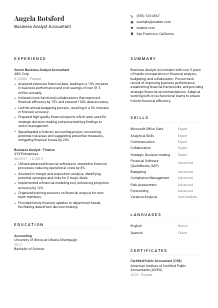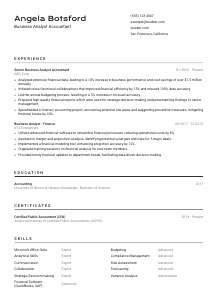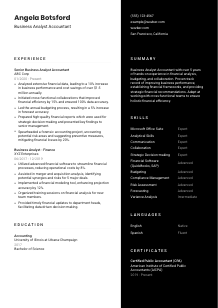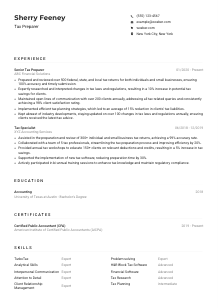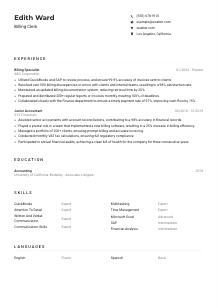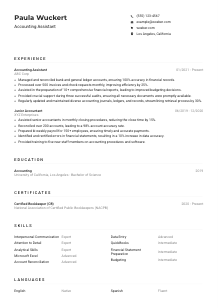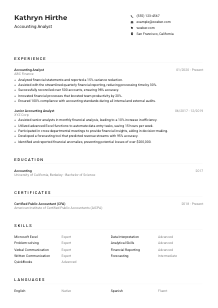Business Analyst Accountant Resume Example
Crunching numbers but your resume doesn't tally up? Dive into this Business Analyst Accountant resume example, structured with Wozber free resume builder. Discover how to seamlessly connect your analytical acumen with accounting insights, positioning your finance career at the top of the ledger!
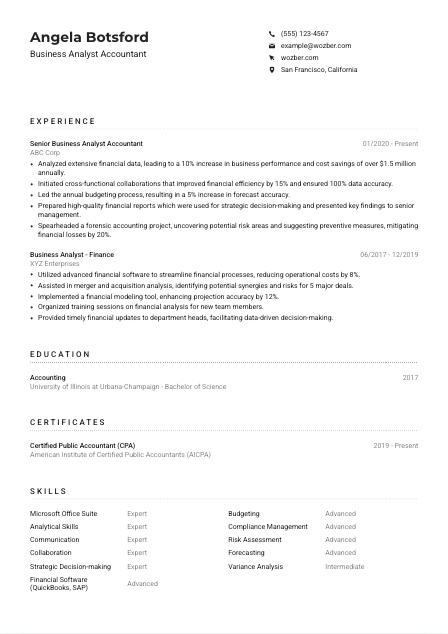
How to write a Business Analyst Accountant resume?
Embarking on the journey to land your dream job as a Business Analyst Accountant starts with one critical step: creating a standout resume. In this guide, we're delving deep into the art of resume crafting, tailored specifically for the unique blend of accounting and analytical prowess this role demands. Leveraging the power of Wozber's free resume builder, including its ATS-friendly resume templates and the precise ATS resume scanner, you're about to transform your professional narrative into a compelling, job-winning document. Let's dive in and make your resume not just a formality, but your ticket to success.
Personal Details
First impressions count, especially on paper. The Personal Details section isn't just a formal requirement; it's your opening handshake, your first step into the room. For a role as detailed and nuanced as a Business Analyst Accountant, every detail here needs to perfect the balance, just like the pivotal financial reports and analyses you're known for.
1. Name as Your Headline
Position your name boldly at the top, making it the headline of your professional story. Ensure it's in a clear, readable font, set slightly larger than the rest, to really make it stand out. In a field where precision and clarity are paramount, this detail speaks volumes.
2. Job Title Alignment
Directly under your name, specify your professional title that closely aligns with the job you're eyeing. For example, using 'Business Analyst Accountant' immediately draws a direct line between you and the position, echoing the targeted role and telling hiring managers that you're speaking their language.
3. Essential Contact Info
Include your phone number and a professional email address. Remember, details matter - a well-formatted email (firstname.lastname@email.com) can subtly enhance your professional image. Double-check for accuracy; in a game of details like accounting, even a small typo can leave a significant dent.
4. Local Advantage
"Must be located in San Francisco, California." If you meet this requirement, state your location clearly. This not only ticks a crucial box but also sidesteps any potential concerns about relocation, setting the stage for a smoother hiring journey right from the get-go.
5. Web Presence
A LinkedIn profile or a personal website can dramatically elevate your resume, especially if they showcase your professional accomplishments or portfolio. Ensure these profiles are polished and mirror the professionalism of your resume, offering a deeper dive into your career narrative.
Takeaway
The Personal Details section is more than just a list of ways to contact you; it's a carefully curated introduction, reflecting your professionalism and readiness for the Business Analyst Accountant role. Tailor each detail to align with the position's requirements, ensuring a strong and impactful first impression.





Experience
The Experience section is where you truly shine, painting a picture of your analytical acumen and precision in accounting. It's all about translating your previous roles into a compelling narrative that resonates with the Business Analyst Accountant position you're aiming for.
- Analyzed extensive financial data, leading to a 10% increase in business performance and cost savings of over $1.5 million annually.
- Initiated cross‑functional collaborations that improved financial efficiency by 15% and ensured 100% data accuracy.
- Led the annual budgeting process, resulting in a 5% increase in forecast accuracy.
- Prepared high‑quality financial reports which were used for strategic decision‑making and presented key findings to senior management.
- Spearheaded a forensic accounting project, uncovering potential risk areas and suggesting preventive measures, mitigating financial losses by 20%.
- Utilized advanced financial software to streamline financial processes, reducing operational costs by 8%.
- Assisted in merger and acquisition analysis, identifying potential synergies and risks for 5 major deals.
- Implemented a financial modeling tool, enhancing projection accuracy by 12%.
- Organized training sessions on financial analysis for new team members.
- Provided timely financial updates to department heads, facilitating data‑driven decision‑making.
1. Dissecting Job Requirements
Begin with a deep dive into the job description. Highlight responsibilities and skills that overlap with your own experiences. This alignment is critical; it forms the foundation of a resume tailored so precisely that hiring managers can't help but see you in the role.
2. Structured Storytelling
Employ a reverse-chronological order to present your roles, ensuring your most relevant and recent experiences take the spotlight first. Under each role, start with your title, the company's name, and your tenure there, forming a clear, easy-to-follow structure that guides hiring managers through your career journey.
3. Achievement-Centric Bullets
Under each role, articulate your achievements with precision and impact. Phrases like "Analyzed extensive financial data, leading to a 10% increase in business performance" not only showcase your expertise but also align perfectly with the responsibilities of a Business Analyst Accountant.
4. Power of Quantification
Numbers speak volumes in any industry, but they're the language of finance. Quantify your achievements wherever possible to provide a tangible measure of your impact and excellence. Be it cost savings or efficiency improvements; let the figures make your case.
5. Relevance is Key
Tailor your experience section to mirror the job at hand. Extraneous information might dilute the impact of your relevant achievements. Use the resume example generated with Wozber to ensure every line on your resume is a step closer to your next role.
Takeaway
Your Experience section isn't just a chronicle of your working life; it's evidence of your readiness for the next step. Tailor it meticulously, keeping the focus on achievements that resonate with the Business Analyst Accountant role, backed by the precision of quantifiable outcomes.
Education
Reflecting on your educational background entails more than listing degrees; it's about highlighting the foundation that has prepared you for the Business Analyst Accountant role. Here's how to ensure your Education section supports your story effectively.
1. Degree Specificity
"Bachelor's degree in Accounting, Finance, or related field" - align your degree title with this requirement precisely. For instance, 'Bachelor of Science in Accounting' directly fits the bill, underlining your tailored educational background for the position.
2. Brevity and Clarity
Structure your educational details concisely: degree title, field of study, institution name, and graduation year. This clarity and brevity make it easy for hiring managers to confirm your educational qualifications match the role's requirements.
3. Degree Relevance
Highlighting your degree is crucial, especially when it directly aligns with the job's educational requirements. Where applicable, tailor this section to show how your specific educational journey has equipped you with the foundational knowledge for a Business Analyst Accountant.
4. Pertinent Courses
While your degree speaks volumes, delving into relevant coursework can further enhance your qualifications. Mention any specialized courses that speak directly to the skills and knowledge required for a Business Analyst Accountant, adding depth to your educational narrative.
5. Additional Achievements
Did you graduate with honors, or were you part of relevant clubs or organizations? While such details may lean towards the periphery, they can add color to your narrative, especially for roles that value continuous learning and commitment, such as the Business Analyst Accountant.
Takeaway
Your Education section is a cornerstone of your resume, reflecting the groundwork of knowledge and skills. Tailor it to resonate with the Business Analyst Accountant requirements, ensuring it corroborates your readiness and suitability for the role you're pursuing.
Certificates
In a field that values precision and continuous improvement, certifications can be your ace in the hole. They're proof of your dedication to excellence and your commitment to staying ahead in the fast-evolving world of accounting and finance.
1. Targeted Certifications
The job description mentions a preference for CPA or CMA certifications. If you hold either (or both), they deserve prime real estate on your resume. These certifications not only meet the preferred criteria but also underscore your advanced expertise and commitment to the profession.
2. Selection Criteria
When listing certifications, focus on those most relevant to the Business Analyst Accountant role. This ensures that your resume remains clutter-free, directing attention to the qualifications that truly enhance your application.
3. Validity and Recency
Include the dates of your certifications to provide context regarding their currency and relevance. Especially in fields that prioritize up-to-date knowledge, showcasing recent certifications or ongoing education can make a powerful statement.
4. Continuous Learning
The finance and accounting field is always evolving, with new standards and technologies emerging. Emphasize your commitment to continued learning and professional development by regularly updating your certifications and seeking out new opportunities to enhance your expertise.
Takeaway
Your certifications tell a story of commitment, expertise, and an unending pursuit of excellence. Select and showcase them with intention, ensuring they illuminate your path to becoming a distinguished Business Analyst Accountant. Let them be a testament to your dedication to the craft.
Skills
The Skills section is your professional toolbox, where you lay out the specific abilities that make you the ideal candidate for a Business Analyst Accountant. This section requires a strategic selection of skills that are most relevant to the position.
1. Relevance
Start by identifying skills from the job description and reflecting on your own repertoire. For a Business Analyst Accountant, this might include "expertise in Microsoft Office Suite", "analytical skills", or "financial software proficiency". Direct alignment with the job's demands will position you as an ideal match.
2. Balancing Hard and Soft Skills
While the hard skills confirm your capability to perform technical tasks, your soft skills, like communication and collaboration, are equally important, especially in roles requiring cross-functional teamwork and presenting findings to management. A balanced presentation of both sets can present you as a well-rounded candidate.
3. Clean Layout
Resist the urge to overload this section. Prioritize and list only those skills that directly apply to your target role. This focused approach ensures that hiring managers can quickly see how your specific skills align with the job's needs, increasing your chances of catching their eye.
Takeaway
The skills you choose to highlight speak volumes about your career focus and professional strengths. Tailor this section thoughtfully, making it a precise reflection of the qualities that make you an exceptional candidate for the Business Analyst Accountant position. Let your skills resonate with clarity and purpose.
Languages
In an increasingly global business environment, linguistic skills can broaden your appeal to employers, especially if the role involves cross-border operations or diverse teams. Here's how to incorporate your language proficiencies into your resume effectively.
1. Relevance
First, examine the job description for any language requirements. For the Business Analyst Accountant role, "Competency in English needed" is explicitly mentioned. Ensure this requirement is clearly met in your resume, positioning English at the top of your languages list.
2. Extra Languages
Beyond the essentials, include additional languages you're proficient in. This can set you apart, especially in roles needing interaction with international stakeholders. It's a subtle nod to your versatility and readiness to engage in diverse business environments.
3. Honest Proficiency
Clearly state your level of proficiency using terms like "Native", "Fluent", "Intermediate", and "Basic". Transparency in your language abilities helps manage expectations and showcases your honesty, a valued trait in any professional setting.
4. The Broader Picture
While this role might not explicitly demand multilingual abilities, consider the broader implications of your linguistic skills. They speak to your ability to navigate diverse cultural landscapes, an invaluable asset in today's globalized business world.
5. Continuous Improvement
View language learning as an ongoing journey. Whether it's maintaining fluency in a second language or picking up basics of another, this commitment to improvement adds an impressive layer to your professional profile, reflecting a globally-minded, adaptable candidate.
Takeaway
Leveraging your language skills can significantly bolster your resume, projecting you as a globally aware and versatile candidate. Highlight your linguistic prowess with honesty and consideration, letting it underscore your suitability for the Business Analyst Accountant role and beyond.
Summary
Your summary is the narrative hook of your resume, providing a succinct glimpse into your professional persona. For a Business Analyst Accountant, it's about striking the perfect balance between analytical rigor and accounting expertise, all in a few compelling lines.
1. Capturing the Essence
Digest the core of the job description, absorbing the spirit of the Business Analyst Accountant role. Your summary should reflect this essence, beginning with an introductory statement that positions you firmly within the profession.
2. Unveiling Your Strengths
Highlight your most relevant skills and achievements, especially those that resonate with the posted job requirements. Statements like "over 5 years of hands-on experience in financial analysis and budgeting" uniquely position you as a top contender.
3. Brevity is Brilliance
Keep your summary concise yet impactful. Aim for 3-5 punchy lines that immediately convey your professional value and make hiring managers want to learn more about you. This is your moment to shine; make every word count.
4. Tailoring Toward the Target
Ensure every part of your summary is intentionally aligned with the Business Analyst Accountant role. This tailored approach demonstrates a deep understanding of the job and an eagerness to fulfill its demands with your unique blend of skills and experience.
Takeaway
Consider your summary the heart of your resume. It's where you consolidate your professional identity, tailored explicitly for the Business Analyst Accountant position. Craft it with care, ensuring it's a potent blend of your strengths and the job's specific needs. Let it be the invitation that compels hiring managers to delve deeper into your story.
Launching Your Business Analyst Accountant Journey
With these insights and Wozber's free resume builder at your disposal, including its ATS-friendly resume formats and state-of-the-art ATS resume scanner, you're now well-equipped to craft a resume that not only meets but exceeds the expectations for a Business Analyst Accountant role. Your resume is your narrative distilled; make it authentic, compelling, and thoroughly reflective of your professional journey. The path to your next great opportunity is laid out before you. Embrace the process, tailor each element of your resume with precision, and prepare to make your indelible mark in the world of business analysis and accounting.

- Bachelor's degree in Accounting, Finance, or related field.
- Minimum of 3 years experience in accounting or financial analysis.
- Proficiency in financial software and Microsoft Office suite.
- Strong analytical, communication, and collaboration skills.
- Certified Public Accountant (CPA) or Certified Management Accountant (CMA) certification preferred.
- Competency in English needed.
- Must be located in San Francisco, California.
- Analyze complex financial data and provide recommendations to improve business performance.
- Collaborate with cross-functional teams to drive financial efficiency and accuracy.
- Assist in budgeting, forecasting, and variance analysis.
- Prepare monthly, quarterly, and annual financial reports.
- Ensure compliance with accounting policies, procedures, and regulatory requirements.





